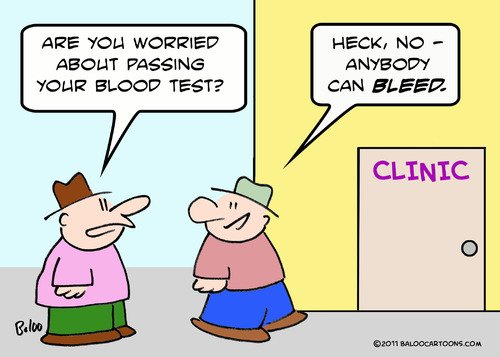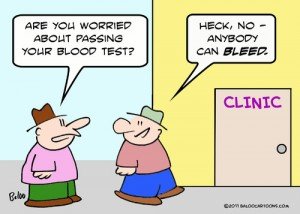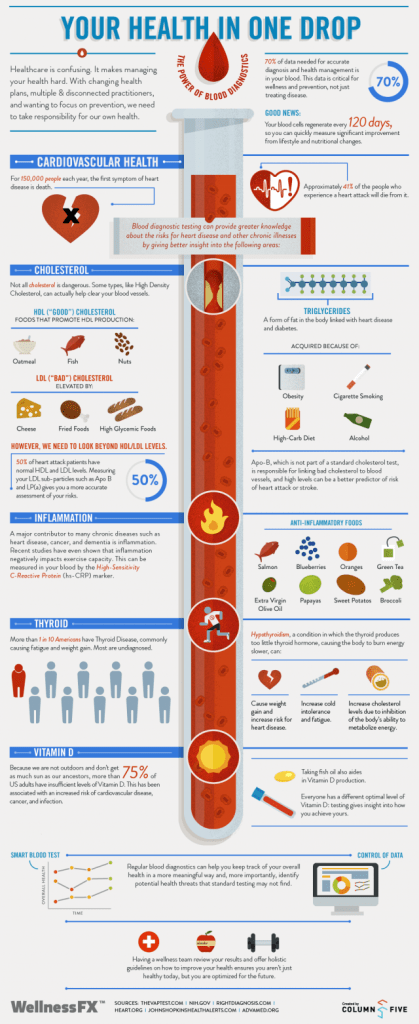Look: Your Blood Test Measures Your Health

You can’t fix something if you don’t know what’s wrong. The right blood test measures a bucket full of information about your health. Check out the infographic by WellnessFX, and get the dope on cholesterol, inflammation, thyroid function and vitamin D.
GIVEN MY interest in technology and health, I keep my eye on the boatload of health-based start-ups launching on the raging river that is health care.
One such company is WellnessFX, which touts:
“Our team is solving an extremely complex and interesting human health problem: how to enable everyday people to optimize their health through the power of information.”
The WellnessFX approach is blood analysis. You give them some, they evaluate it and provide various metrics that assess your level of health.
As their infographic – “Your Health In One Drop” – says , 70% of the data needed for diagnosis and health management resides in your blood.
So lets grab and flesh out each of the different health metrics that WellnessFX measures.
We’ll take a look at:
- Cholesterol,
- Inflammation,
- Thyroid, and
- Vitamin D.
After we examine each of these metrics, I’ll get a bit into the blood tests; those done by WellnessFX and the Life Extension Foundation. (Scroll to the bottom for links.)
Cholesterol
In our modern world, many of us are beset with high cholesterol. Our doctors, beleaguered from the sisyphean task of trying to influence us to eat better, resort to giving us what we really want – the magic pill that will make it go away.
Statins!
But there’s a downside to statins, for they come with a long list of side effects, including:
Myalgias, arthritis/ arthralgias, diarrhea, headache, rashes, elevation of liver transaminases, elevation of creatine kinase a muscle enzyme, various gastrointestinal symptoms including flatulence, dyspepsia, diarrhea, and abdominal pain, and various infection symptoms.
After reading that list, if you need more motivation to move away from statins and toward a lifestyle shift, here are some more side effects that are life threatening:
Rhabdomyolysi, Stevens-Johnson Syndrome, toxic epidermal necrolysis, photosensitivity, vasculitis, polymyalgia rheumatica, angioedema, anaphylaxis. (Source for statin side effects.)
I dig into some statin details in the post, Cholesterol Drug “Lipitor” Loses its Patent – A Good Deal for You?.
But that’s not all, another post, High Cholesterol? Do Something! offers a simple, could-be-effective supplement you could ask your doctor about, and 12 Myths About Cholesterol reviews some common beliefs about cholesterol that are wrong – that is until science reverses itself.
Even if you know your HDL and LDL numbers, and even if they’re normal, you may not be in a position to celebrate with a rib eye, for as the Infographic below says:
“50% of heart attack patients have normal HDL and LDL levels.”
Your triglyceride numbers and other cholesterol factors (“sub-particles”) could be sub-optimum, so if your diet or family history puts you at risk, it’s time to find out the particulars via the right blood test. (See “Blood Testing” below.)
Inflammation
In recent years, science has revealed that inflammation may be a root cause of many degenerative diseases, as inflammation seems to set up the right environment for disease to prosper.
Time Magazine put this foursquare on its cover in 2004 and called it, “The Secret Killer”.
A good blood test measures inflammation by the High Sensitivity C-reactive Protein marker.
One of the first places you notice inflammation is in your joints – they don’t bend properly and are sore. I’ve written about this in a post called, Inflammation… the Band of Joints, and Soreness Ain’t Swell, which present some good resources to learn how to reduce inflammation and improve joint mobility.
Thyroid
One in ten Americans may have thyroid disease, as the infographic states, but as I write in American’s Have Too Little Iodine, Dr. Brownstein – a thyroid expert – says the story is more significant than that.
Dr. Brownstein has checked over 5,000 people in his practice, and 95% have been iodine deficient. He recommends 50 to 100 milligrams of iodine to pump up iodine levels, and then 6 to 50 milligrams on a sustained basis after initial doses.
An improper functioning thyroid can cause weight gain, impair the immune system and increase cholesterol.
For insights about the thyroid, watch Dr. Mark Sircus interview Dr. Brownstein here.
Vitamin D
I’ve written quite a bit about vitamin D for the simple reason that it is:
- Exceedingly important for health, and
- Deficient in many people.
Basically, there are five ways to get Vitamin D:
- 15 Minutes of Sun 3 Times Per Week
You can get 10-15 minutes of high-noon sun exposure in warmer climates a few times a week. In the South you can do this all year long; but in the North it will work only in the summer months. But this is unrealistic for those who already wear sunscreen all day, or have been warned to stay out of the sun by their doctors. - Fatty Fish and Cod Liver Oil
If you are one of those people who have been warned to stay out of the sun, another good natural source of Vitamin D is fatty fish, like salmon and in cod liver oil. - Fortified Dairy Products
You also can get Vitamin D in fortified dairy products; however, there are only 100 units of Vitamin D per cup, so children and most adults would need at least four cups of dairy products per day. (Do you really want to ingest that much diary? Go for #5) - Multivitamin Supplements
Although it varies by brand and the amount taken, most multivitamins have a substantial amount of vitamin D. - Vitamin D Supplements
A good target is to take 1000 to 2000 international units of Vitamin D supplements every day. D3 is considered more potent and longer lasting, but if unavailable, both D2 and D3 are acceptable. All versions are cheap and side effects are very rare.
And there are at least 30 reasons to pay attention to the five ways cited above, which I describe, and Vitamin D expert Dr. Michael Holick delightfully demonstrates, in 30 Reasons To Take Vitamin D.
Blood Testing
Getting a blood test is easy and a relatively cheap way to learn a lot about your health.
As it pertains to the health metrics we’re here examining, you can either have WellnessFX manage the procedure, or do it via the Life Extension Foundation (“LEF”).
Which one you do depends on what you wish to measure, and how much moola you’re willing to spend.
WellnessFX’s test will give you results for each of the health metrics herein discussed; whereas, LEF provides a more comprehensive test for cholesterol, inflammation and Vitamin D — called the “VAP PLUS” – but it doesn’t measure thyroid function. So, if thyroid function is an important test for you, either go with WellnessFX, or get the LEF Thyroid Antibody Panel Test.
Here are links and prices for the blood tests:
-WellnessFX $199 (limited offer), regular $239 Link
-Life Extension VAP™ PLUS Blood Test $330 (Member), $440 (Non-member)
-Life Extension Thyroid Antibody Panel Blood Test $99 (Member), $132 (Non-member)
If you need a story to motivate you, read about the Male Comprehensive Hormone Panel Blood Test I had done in these two posts:
Odds Are, You Need To Measure and Boost Your Testosterone, and
How I’m Boosting Testosterone and Blasting Fat.
Yeah, that should do it.
Ciao for now.
Last Updated on February 28, 2022 by Joe Garma




